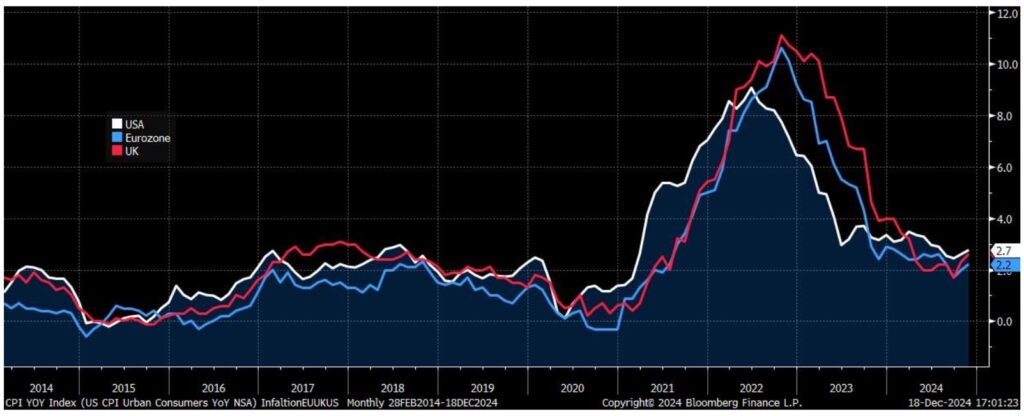As the year draws to a close, all eyes have been on central banks to navigate a complex global economic landscape, through their evolving monetary policy. With a backdrop of persistent inflationary pressures, geopolitical tensions, and slowing growth in key markets, these developments are not just headline news for investors. In this update, our Chief Investment Officer, Jeff Brummette, explores the implications of recent central bank meetings and their latest decisions, highlighting the key takeaways for our clients and partners.
The Bank of England (BOE) and the US Federal Reserve Bank (Fed) held their last monetary policy meetings of 2024 this week (following the European Central Bank (ECB) meeting from last week).
All three central banks are confident that they have defeated inflation and reduced it to levels that have allowed them to lower interest rates, and subsequently reduce the restrictiveness of monetary policy.
Inflation – US, Eurozone and UK

Source: Bloomberg Finance L.P.
The ECB and the Fed have both cut rates by 100 basis points this year, while the BOE has cut by just 50 basis points. The BOE has also just seen the government announce a budget that will increase taxes on employers and increase overall government spending at a time when the labour market is at full employment. They are naturally concerned that inflation may not decline as fast as they would like.
The ECB faces different issues as political dysfunction in both France and Germany are contributing to slower economic growth and worsening business sentiment. This suggests to us that they will continue to be more aggressive in lowering rates than the BOE and even the Fed.
The Fed have the biggest challenge of all to face, as they need to determine how newly elected President Trump and his administration’s economic policies will impact growth and inflation. At this last meeting, they lowered their forecast for rate cuts in 2025 to two from their previous forecast of four. They now see a year-end Fed funds rate of 3.9%, their previous forecast was 3.4%. Chair Powell expressed that the Fed would need to see more progress on inflation for the Fed to continue lowering rates.
Trump has promised lower taxes, less regulation and a better environment for businesses in America. How he achieves this could put upward pressure on inflation. The Fed might have to resist this aspect by halting their cutting, or by even raising rates. Trump will not be happy with this and will put pressure on the Chairman Powell and the Fed. Financial markets will not like this.
The Bank of England held rates unchanged at 4.75% at their final meeting today. They echoed the Fed in stating that “A gradual approach to removing monetary policy restraint remains appropriate.”
Predicting central bank behaviour in 2025 is going to be more difficult as the banks themselves are not even certain of what they will need to do next. This will lead to greater volatility in markets. Our investment team will continue to keep you updated on any further developments of note.
_______
Hear more from the Oakglen experts
Our investment team continue to provide interesting and informative content to help keep you in the loop on recent global news and market trends. See below for some key highlights from around the world which our Chief Investment Officer, Jeff Brummette, has recently covered:
Read more:
You can read other articles from the team on our News & Insights page.
Sign up below to receive similar content directly into your inbox.
Want to become an Oakglen client?
Get in touch with one of our wealth team via the Contact Us page to hear more about our products and services, and how suitable they are for you and your personal circumstances.

